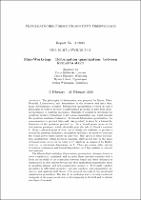Zusammenfassung
The philosophy of deformation was proposed by Bayen, Flato, Fronsdal, Lichnerowicz, and Sternheimer in the seventies and since then, many developments occurred. Deformation quantization is based on such a philosophy in order to provide a mathematical procedure to pass from classical mechanics to quantum mechanics. Basically, it consists in deforming the pointwise product of functions to get a non-commutative one, which encodes the quantum mechanics behaviour. In formal deformation quantization, the non-commutative product (also said, star product) is given by a formal deformation of the pointwise product, i.e. by a formal power series in the deformation parameter which physically play the role of Planck’s constant $\hbar$. From a physical point of view this is clearly not sufficient to provide a reasonable quantum mechanical description and hence one needs to overcome the formal power series aspects in some way. One option is strict deformation quantization, which produces quantum algebras not just in the space of formal power series but in terms of $C$*-algebras, as suggested by Rieffel, with e.g. a continuous dependence on $\hbar$. There are several other options in between continuous and formal dependence on $\hbar$ like analytic or smooth deformations.
The Oberwolfach workshop Deformation quantization: between formal to strict consolidated, continued, and extended these research activities with a focus on the study of the connection between formal and strict deformation quantization in their various flavours and their applications in particular those in quantum physics and non-commutative geometry. It brought together specialists in differential geometry, operator algebras, non-commutative geometry, and quantum field theory with research interests in the mentioned quantization procedures. The aim of the workshop was to develop a coherent viewpoint of the many recent diverse developments in the field and to initiate new lines of research.

